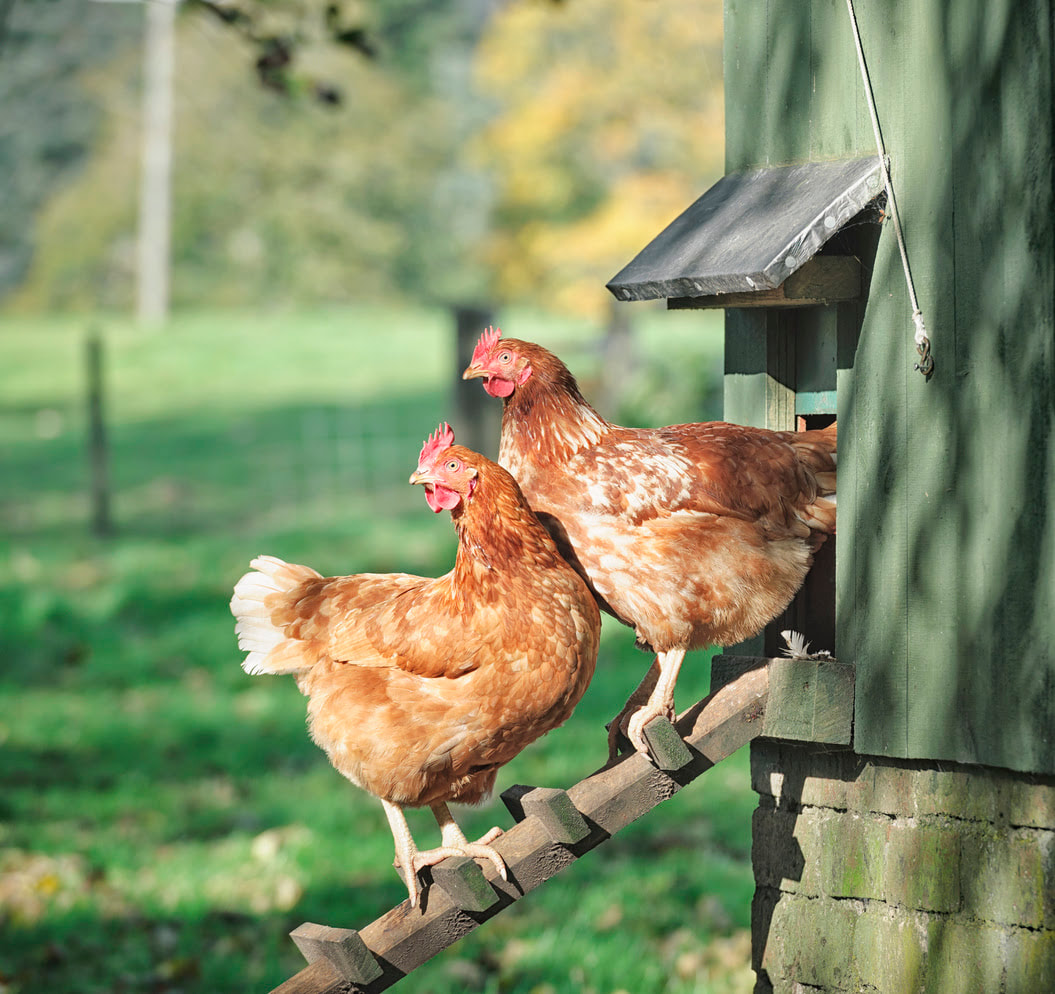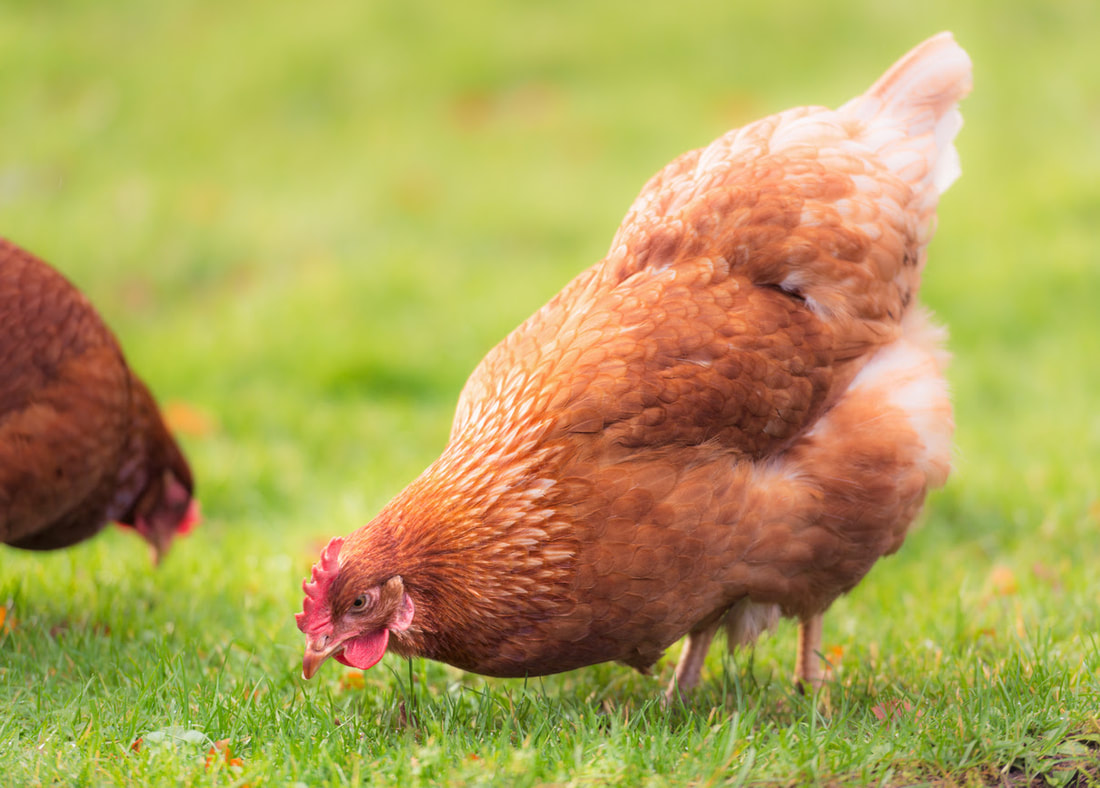|
Just like our digestive tract, that of the chicken is lined with trillions of tiny bacteria. Most of these bacteria are good, keep the digestive tract (and rest of the body) healthy, and even help with digestion. One way to keep the digestive tract of a chicken happy and functioning properly is to create a balanced environment of bacteria. We can help with this process by supplying our chicken friends with more beneficial bacteria, called probiotics. Probiotics are live bacteria that are added to an animal’s diet, they line the digestive tract and interact directly with the chicken’s own cells to help food digestion and promote immunity. Probiotics have also been considered as good alternatives to treating animals with antibiotics. Although it is not completely understood how these bacteria promote health, the use of these beneficial bacteria in both humans and farm animals is an area of intensive research.
Choosing the Right Probiotic Choosing the right probiotic is very important, as some that may be good for humans may not be good for chickens. It is important to do your research for studies showing positive (and negative) effects of probiotics on chicken health. One probiotic that has received a lot of attention for its positive impact on chicken health is Lactobacillus acidophilus. This is a Gram-positive bacterium that does not cause disease, and actually has been shown to reduce disease-causing bacteria! Below are some summaries of research using L. acidophilus to promote chicken health and performance. Effects on Feed Intake and Growth Performance One study on supplementing chicken diets with L. acidophilus showed a significant beneficial effect on body weight gain between 15–28 d and improved feed conversion rate in the overall period. Along with this, litter moisture and pH were not impacted. The researchers found a significant difference in decrease of potentially harmful bacteria, results that were attributed to the improvement of the intestinal microbial balance by competitive exclusion (crowding out the harmful bacteria). Another study showed similar results, with better feed conversion ratios. Broiler meat quality has also benefited from probiotic supplementation. Effects on Egg Production and Quality Probiotics such as L. acidophilus added to diet improved daily egg production in hens, and some studies showed direct increases in egg production that also corresponded to increases in daily probiotic supplementation. While I could not find any studies showing differences in egg shell hardness with probiotic supplementation, one study showed higher egg weight from Lactobacillus fed hens. Others have also shown decreases in egg yolk cholesterol, presumably due to the ability of L. acidophilus to absorb cholesterol. Pathogen Reduction The use of probiotics has been shown to improve natural defenses against pathogenic bacteria. Studies have shown that L. acidophilus and other probiotics can inhibit the growth of Campylobacter jejuni, an important source of intestinal illness in humans. Another important finding was that newly hatched chickens could be protected against infection by Salmonella enteritidis. In addition to this, L. acidophilus increases antibody production against viruses such as the one causing Newcastle disease, a devastating respiratory disease, that also leads to depression, nervous manifestations, or diarrhea in the chickens. The positive effects of L. acidophilus encompass more than I can include here, such as reducing diarrhea and smelly feces, and these bacteria also aid in suppressing pest flies…just to name a few! One way to add these beneficial bacteria to your flock’s diet is with PopWorms! PRO. Chickens love these black soldier fly treats, and each bag is packed with L. acidophilus that delivers natural nutrition! To help us celebrate the launch of this new product, use the coupon code PRO for $2.00 off each bag of PopWorms! PRO you buy (valid through 7/7/2019). Check them out today!
1 Comment
Chickens are not just great for having fresh eggs every morning. They can actually be quite entertaining! If you are considering adding backyard chickens to your homestead, here are some fun facts about chickens that we're sure will encourage you to do so.
1. Chickens are very intelligent. Research has shown that chickens have much higher cognitive, emotional, social, and personal attributes and abilities than originally believed. They understand object permanence - something that young children don't understand until later - and are able to use Machaivellian manipulation to get what they want. They can even be trained! A quick look at this video is sure prove this fact...plus put a smile on your face. 2. Chickens feel emotions. Chickens care! Scientists tested mother hens' responses to distress of their chicks and found that they were affected by the emotional state of their chicks. 3. Hens enjoy classical music. On accident, a farmer who was playing opera and classical music during some minor construction on his farm, discovered that his hens laid more, larger eggs when they listened to it. Apparently, the soothing sounds block out noises that hens might find distressing. 3. Hens communicate with their chicks while they're still in the shell.Not only that, but the un-hatched chicks will chirp back to their mother. Mother hens are very protective of their young. 4. Hens lay an average of 350 eggs per year. However, this number can vary depending on the breed and weather/lighting. The largest recorded egg according to the Guinness Book of World Records is 15 ounces and was laid by a White Leghorn in New Jersey, in 1956. 5. Chickens can see better than humans. Not only can chickens see (and dream) in full color, but they can also see ultraviolet lights that humans cannot see. 6. Chickens, however, can't taste as well as humans. Humans have around 9,000 tastebuds throughout their mouth but chickens only have a fraction of this located in the backs of their mouths which means they don't even taste the food they're eating until they've swallowed it. 7. Chickens can make great pets. Since chickens are clearly intelligent, emotional, and social, it's no surprise that raising back yard chickens has boomed in popularity in the U.S. While you might originally begin raising chickens for the eggs or meat, you might find that you just fall in love with this quirky, funny fowl. Does my chicken's crop look normal? Is my chicken having diarrhea? Why is my chicken eating rocks? If you're asking yourself any of these questions, you might wish to learn a bit more about how your chickens eat, digest, and excrete their food. Chickens have some organs that are similar to mammals such as large and small intestines, pancreas, and liver, but other aspects of chicken anatomy are very different and can be confusing to new chicken owners. Here's an overview of how a healthy chicken's digestive system works.
Pecking and Swallowing Chickens are omnivores and will probably eat just about anything you feed them. However, that doesn't mean that they should eat anything. Healthy chickens eat foods such as corn, seeds, greens, worms, and more. Chickens also eat grit, or small stones, to help them chew their food, since they don't have teeth. In order for your chickens to be healthy, it's very important that you research what your breed of chicken should be consuming. As human children, we were always told to not swallow without chewing our food. Chickens, however, don't have any teeth! Instead, they simply gulp down their food whole. In the chicken's mouth, food is mixed with a small amount of saliva and digestive enzymes. Next, the food travels down the chicken's esophagus and is temporarily stored in their crop to be digested later. A chicken's crop will naturally look larger after eating since they have food stashed there. Food can stay in a chicken's crop for up to 12 hours, and it is slowly sent down the esophagus to the next destination. Digestion After exiting the crop, the food moves down into the chicken's version of a stomach, called a proventriculus. Similarly to the stomach of mammals, the food is mixed with hydrochloric acid and other enzymes to help digest it. However, the food still hasn't been chewed yet. This happens in the second sort of "stomach" called the gizzard. In the gizzard, the food is ground up by small stones (or grit) that the chicken ate earlier. Make sure that you keep small pieces of metal and glass away from your chickens, because sharp objects will get stuck in the chickens' gizzard and poke a hole in it, eventually killing your chicken. Next, the food is digested further in the small intestines, pancreas, liver, and gall bladder. The large intestines then remove nutrients from the food. After the large intestines, the chickens have ceca, which are two pouches where they extract more nutrients by fermenting the remainder of the food that isn't digested yet. Every day, the chicken empties its ceca with an excrement that is pasty and light brown. The final parts of the chicken's digestive system are the cloaca and the vent. In the cloaca, urinary waste is mixed with the digestive waste, since chickens don't have bladders. Finally, the waste is excreted through the vent. Common Digestive Problems Some common chicken digestive problems include an impacted crop, sour crop, or pendulous crop. An impacted crop means the opening to the esophagus from the crop is blocked. This happens because something has gotten stuck in the crop such as string or tough, long pieces of grass. Your chicken might have an impacted crop if its crop is always full even if it hasn't eaten in a while, if the crop feels hard, or if the chicken is acting out of the ordinary. Sour crop is a yeast infection in the crop, similar to thrush in humans. A sign of sour crop is that the crop is full and feels squishy, the bird's breath smells sour, or the bird has white patches in the mouth. Pendulous crop is when the crop has been stretched out and swings lower than it normally would. Pendulous crop can sometimes be caused by an impacted crop. The chicken may seem like it's okay, but the muscles in the crop are being damaged and require medical attention. If you're looking to further benefit your chicken's digestive health, check out the delicious, nutritious treats for chickens at PopWorms. |
PopWorms!®
|
|
Site Map
|
Products
Dry Products
PopWorms!® ECO Popworms!® ECO Bulk PopWorms!® PRO Live Products PopWorms!® LIVE PopWorms!® Leftovers |
Shipping
Site-wide
Free Shipping Over $25 |



 RSS Feed
RSS Feed


